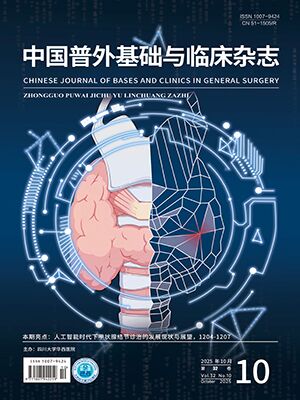| 1. |
La Vecchia C, Lucchini F, Franceschi S, et al. Trends in mortality from primary liver cancer in Europe. Eur J Cancer, 2000, 36(7):909-915.
|
| 2. |
Shibuya K, Yano E. Regression analysis of trends in mortality from hepatocellular carcinoma in Japan, 1972-2001. Int J Epidemiol, 2005, 34(2):397-402.
|
| 3. |
Eheman C, Henley SJ, Ballard-Barbash R, et al. Annual Report to the Nation on the status of cancer, 1975-2008, featuring cancers associated with excess weight and lack of sufficient physical activity. Cancer, 2012, 118(9):2338-2366.
|
| 4. |
Jarnagin W, Chapman WC, Curley S, et al. Surgical treatment of hepatocellular carcinoma:expert consensus statement. HPB (Oxford), 2010, 12(5):302-310.
|
| 5. |
No authors listed. Obesity:preventing and managing the global epidemic. Report of a WHO consultation. World Health Organ Tech Rep Ser, 2000, 894:i-xii, 1-253.
|
| 6. |
Polesel J, Zucchetto A, Montella M, et al. The impact of obesity and diabetes mellitus on the risk of hepatocellular carcinoma. Ann Oncol, 2009, 20(2):353-357.
|
| 7. |
Renehan AG, Soerjomataram I, Tyson M, et al. Incident cancer burden attributable to excess body mass index in 30 European countries. Int J Cancer, 2010, 126(3):692-702.
|
| 8. |
Regimbeau JM, Colombat M, Mognol P, et al. Obesity and diabetes as a risk factor for hepatocellular carcinoma. Liver Transpl, 2004, 10(2 Suppl 1):S69-S73.
|
| 9. |
中华人民共和国卫生部. 原发性肝癌诊疗规范(2011年版). 临床肝胆病杂志, 2011, 27(11):1141-1159.
|
| 10. |
夏锋, 王曙光, 别平, 等. Pringle法导致的肝脏缺血再灌注损伤对肝癌肝切除患者预后的影响. 中华消化外科杂志, 2009, 8(2):103-106.
|
| 11. |
倪国华, 张璟, 郑风田. 中国肥胖流行的现状与趋势. 中国食物与营养, 2013, 19(10):70-74.
|
| 12. |
王嘉译, 周成, 吴越, 等. 肥胖对肝癌患者肝切除术预后的影响. 肝胆胰外科杂志, 2013, 25(4):275-278.
|
| 13. |
Wang SH, Yeh SH, Lin WH, et al. Identification of androgen response elements in the enhancer I of hepatitis B virus:a mechanism for sex disparity in chronic hepatitis B. Hepatology, 2009, 50(5):1392-1402.
|
| 14. |
Chiang CH, Lai JS, Sheu JC, et al. The risky body mass index ranges for significant hepatitis B viral load:A campus-based study. Obes Res Clin Pract, 2012, 6(1):e1-1e90.
|
| 15. |
Balzan S, Nagarajan G, Farges O, et al. Safety of liver resections in obese and overweight patients. World J Surg, 2010, 34(12):2960-2968.
|
| 16. |
刘家宏, 卢云. 身体质量指数与肝癌患者术后肝功能预后的关系. 国际外科学杂志, 2011, 38(4):238-240.
|
| 17. |
Cucchetti A, Cescon M, Ercolani G, et al. Safety of hepatic resection in overweight and obese patients with cirrhosis. Br J Surg, 2011, 98(8):1147-1154.
|
| 18. |
Tanaka S, Iimuro Y, Hirano T, et al. Safety of hepatic resection for hepatocellular carcinoma in obese patients with cirrhosis. Surg Today, 2013, 43(11):1290-1297.
|
| 19. |
Saunders JK, Rosman AS, Neihaus D, et al. Safety of hepatic resec-tions in obese veterans. Arch Surg, 2012, 147(4):331-337.
|
| 20. |
Itoh S, Ikeda Y, Kawanaka H, et al. The effect of overweight status on the short-term and 20-y outcomes after hepatic resection in patients with hepatocellular carcinoma. J Surg Res, 2012, 178(2):640-645.
|
| 21. |
Utsunomiya T, Okamoto M, Kameyama T, et al. Impact of obesity on the surgical outcome following repeat hepatic resection in Japanese patients with recurrent hepatocellular carcinoma. World J Gastroenterol, 2008, 14(10):1553-1558.
|
| 22. |
Hotamisligil GS. Inflammation and metabolic disorders. Nature, 2006, 444(7121):860-867.
|
| 23. |
李敏如, 易述红, 蔡常洁, 等. 肝癌患者术前HBV DNA定量水平与肝移植术后肝癌复发关系的探讨. 中华普通外科杂志, 2010, 25(9):717-719.
|
| 24. |
刘立国, 吴健雄. 乙肝病毒因素对肝癌肝切除及肝移植术后复发的影响. 中华肝胆外科杂志, 2012, 18(5):398-400.
|
| 25. |
Huang G, Lai EC, Lau WY, et al. Posthepatectomy HBV reactivation in hepatitis B-related hepatocellular carcinoma influences postoper-ative survival in patients with preoperative low HBV-DNA levels. Ann Surg, 2013, 257(3):490-505.
|




